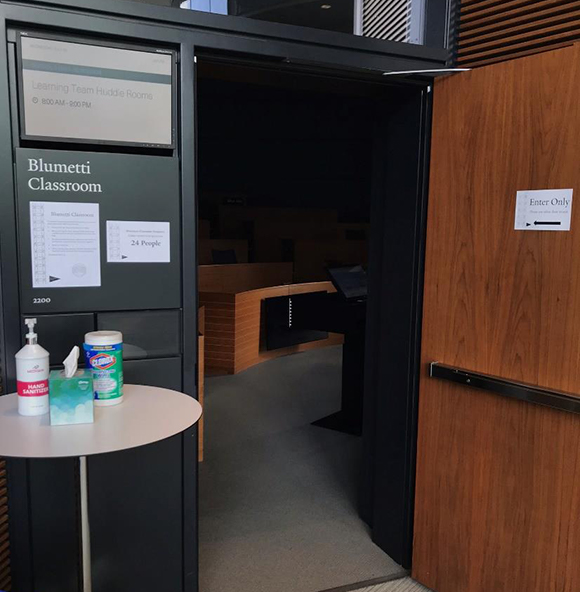How Yale SOM Is Bringing Students Back to the Classroom
A hybrid format will allow the school to deliver the academic rigor and strong sense of community that characterize the Yale SOM experience while stringently maintaining social distancing requirements.
By Karen Guzman
Fall classes in the Yale School Management’s residential master’s degree programs begin on August 31. After the school moved classes online in the spring, faculty and administrators spent much of the summer making plans for the fall, with the aim of delivering the academic rigor and the strong sense of community that characterize the Yale SOM experience while stringently maintaining social distancing requirements.
The result is a hybrid format, with students attending class both in person and online.
“I have been amazed at the hard work and thoughtful contributions from Yale SOM faculty, staff, and students throughout this tumultuous period,” said Deputy Dean Anjani Jain. “It is evidence of the community’s heartfelt commitment to advancing our mission to educate leaders for business and society, even through the most trying circumstances.”
The school established planning committees that drew on academic, business, and student perspectives, as well as taking into account Yale University’s policies.

Faculty and students generally agreed that the hybrid approach would allow students and faculty to make important connections, said Yale SOM Deputy Dean Edieal Pinker, who served on the committees.
“High-quality education is a partnership between faculty and students, and between students themselves,” Pinker said. “In-person interaction is important to establishing that co-production partnership.”
Pinker added that students come to SOM for more than courses. “They come to be part of a community,” he said. “Being in class with others and being in the building is important to creating shared experiences. It’s very isolating to sit alone at home in front of a screen every day. The partial in-person experience will help break that isolation. It’s good for everyone if done carefully.”
And many safeguards are in place as Yale SOM students return to campus. “Foremost is reducing the number of students in the building and in the classrooms at any one time,” Pinker said.
In Edward P. Evans Hall, classroom seating is spaced widely, and students, faculty, and staff are required to wear masks. In general, students will attend any given course in person half the time and join remotely for the remaining sessions.
“Our facilities staff have also done an incredible amount of high-quality work to make Evans Hall safer,” Pinker said. “This includes special door handles, directional signage, improved air filtration, and the regular cleaning of all spaces around the building.”
The school remains prepared to adjust all plans based on public health conditions and guidance from the State of Connecticut, but the people behind the planning see real value in making the effort to launch the hybrid model. Rick Antle, the William S. Beinecke Professor of Accounting, worked on the teaching delivery plan for the MBA for Executives students, who returned to Evans Hall on July 10.
“Conveying facts and developing skills are parts of the educational process, but real education involves changing how we think,” said Antle.“The best learning experiences involve a relationship. That is why some of the most memorable people in many peoples’ lives are teachers and mentors—those people who provided models of how we can use our minds. Having some in-person time is vital for crafting that relationship.”
Heather Tookes, professor of finance, has served on two committees that are charged with evaluating effective course delivery: a university planning committee focused on the in-person classroom experience at Yale and a Yale SOM student government committee that has met with faculty and staff weekly throughout the summer.
“In talking to students, one message is clear: above all else, there is a strong desire for an in-person experience,” Tookes said. “Whether interacting with faculty or with one another, they really value regular contact within Evans Hall.”
Students continue to provide critical feedback and perspective that is guiding the school, Tookes said.
“While this committee was created during a time of unprecedented crisis, the thoughtful commentary and organization from the student side has been a silver lining,” she explained. “Their engagement has made me prouder than ever to be part of a school like ours.”



